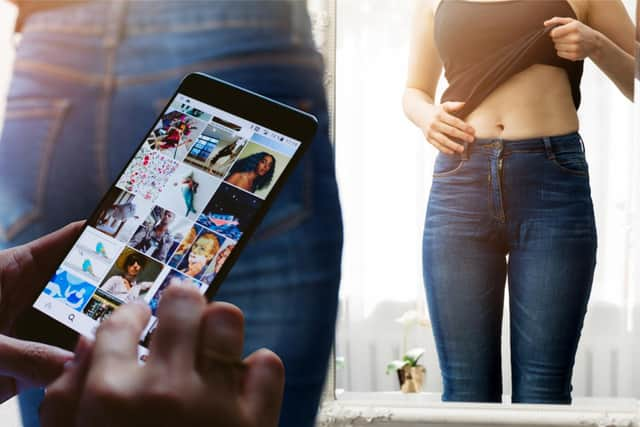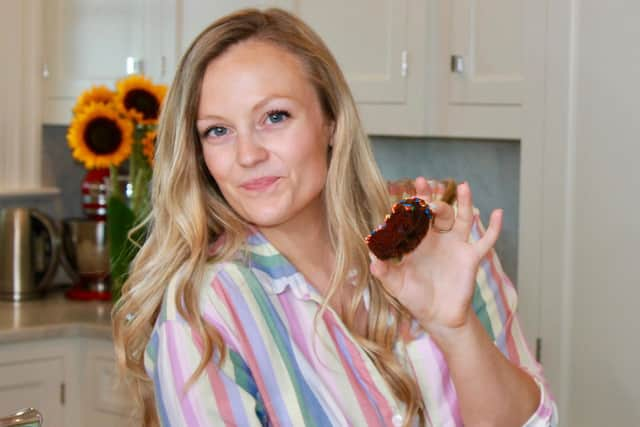Instagram urged to act over dangerous diet drug Apetamin promoted by high-profile influencers
and live on Freeview channel 276
Instagram has come under fire for failing to clamp down on accounts promoting a dangerous diet drug called Apetamin.
The drug has been promoted by social media influencers as a quick fix to achieve an hourglass figure, but it is an unlicensed medicine in the UK and the United States.
Advertisement
Hide AdAdvertisement
Hide AdHealth experts say the promotion of diet products on Instagram, coupled with the easy ability to edit images, has helped fuel unrealistic body standards and body image disorders which has led to a rise in illegal Apetamin use.


Lauren Sharpe, 24, registered dietitian and owner of Empower Method Nutrition, has dealt with the pressures posed by social media first hand.
She previously used the ‘skinny app’ to make herself look a certain way when she struggled with orthorexia, an eating disorder which involves an unhealthy obsession with healthy eating.
Speaking exclusively to NationalWorld, Ms Sharpe said: “My idea of perfection was thin, toned and beautiful, as that has always been the narrative I’ve been fed through the media growing up and through society.
Advertisement
Hide AdAdvertisement
Hide Ad“I think being in high school or college is a very vulnerable time for a lot of girls. Everyone is looking to that external validation that you get when someone compliments your body or your beauty.


“Social media only plays into those vulnerabilities by creating apps like the skinny app, and filters that are not realistically attainable. These apps and filters can be extremely detrimental and unrealistic to what a woman's body looks like.”
Apetamin is targeted at young women and girls as a means to achieve a ‘slim thick’ body, an hourglass shape made popular by celebrities like Kim Kardashian and Cardi B, but the drug has been linked to nasty side effects including dizziness, tremors, blurred vision, nausea and liver failure.
It contains a sedative antihistamine called cyproheptadine hydrochloride, which is illegal in the UK and it has not been approved for safe consumption by the Medicines and Healthcare products Regulatory Agency (MHRA), meaning it should not be sold, supplied or advertised.
Advertisement
Hide AdAdvertisement
Hide AdDespite this, Apetamin is widely available online and in some shops, and has been marketed by influencers on Instagram.
Dr Allison Chase, psychologist at the Eating Recovery Center in the US, explained that sensationalised images on social media can promote an unrealistic ideal of a “normal” or “healthy” body, which can be very damaging.
Dr Chase told NationalWorld: “People frequently compare themselves to others and social media creates an environment in which users compare their lives to the “perceived life” of the person posting.
“For many, these heavily edited posts will not trigger a significant problem, but for someone who struggles with disordered eating or other mental health issues, these posts can be very damaging and lead to problematic behavior.
Advertisement
Hide AdAdvertisement
Hide Ad“It can be especially dangerous when people post advice for excessive calorie restriction or removing food groups or supplements or pills that do something “magical”. Extreme behavior or “quick fixes” can be harmful to one’s health and promote disordered eating.”
NHS England has urged Instagram, which is owned by Facebook, to clamp down on accounts which are selling or marketing the drug.
NHS leaders said in an open letter that they are concerned about the product’s promotion and its impact on both physical and mental health.
The letter, which has been sent by National Medical Director Stephen Powis and National Mental Health Director Clare Murdoch ‘on behalf of NHS patients, staff and people experiencing body dysmorphia and other mental health conditions, as well as their families’, demands an urgent update on what action is being taken to tackle accounts selling the drug.
Advertisement
Hide AdAdvertisement
Hide AdIt has also been signed by the Body Dysmorphic Disorder Foundation, which has asked Instagram to confirm whether it thinks social media firms should contribute more financially to mental health services for young people, as it is claimed they are increasingly being called on.
‘We need to change the conversation’
Many brands now post images depicting ‘real’ women, where scars, stretch marks, cellulite and freckles have not been filtered out in a bid to promote body positivity.
However, Ms Sharpe said that more still needs to be done.
She added: “We grow up with this narrative continuously being instilled upon us that if we want to be accepted, loved, worthy, or successful we have to be a certain size.
“We need to start to change the conversation about what an 'ideal' or 'picture perfect' woman looks like and the only way to do that is to start diversifying our feeds on social media, but also what we see in the media.
Advertisement
Hide AdAdvertisement
Hide Ad“We need to start showing all sizes in magazines, lead roles in movies, dolls, models, honestly anywhere that has influence should show all body types.
“One of the first steps I took for myself was curating my social media to show more cellulite, stretch marks, etc. to prove to myself that this was normal, and it was a huge help.”
A Facebook company spokesperson said: “The wellbeing of our community is our top priority, and buying and selling non-medical or prescription drugs is strictly against our policies.
“We remove accounts that sell Apetamin when we become aware of them and block related hashtags so this content is harder to find. We’ll continue working with law enforcement and youth organisations to help keep drug sales of any kind off Instagram.”
Advertisement
Hide AdAdvertisement
Hide AdInstagram has said it is now working to make the platform a more supportive place and has introduced several policies to limit the promotion of certain products that can be damaging, including diet teas, supplements and cosmetic surgery.
The platform now removes any content that makes a ‘miraculous claim about certain diet or weight loss products’, and limits content that ‘promotes the use of weight loss products or cosmetic procedures, and has an incentive to buy or includes a price, to people over 18’.
Ads are also banned from containing ‘before and after’ images, or images that contain ‘unexpected or unlikely results’.
An Instagram spokesperson added: “We’ve been working on several initiatives to help improve wellbeing and promote body positivity on Facebook and Instagram, from the option to remove likes to help minimise comparison culture, through to the removal and restriction of certain diet products and cosmetic procedures.
Advertisement
Hide AdAdvertisement
Hide Ad“Most recently, we announced a new partnership with CALM to get more men talking about how they feel about their bodies and take the conversation to the mainstream.
“To mark National Eating Disorders Awareness Week in the US, we partnered with the National Eating Disorders Association (NEDA) and some of Instagram’s most popular creators on our #AllBodiesAreWelcome campaign. The series of Reels encourages people to reconsider what body image means to different people, how to manage social comparison on social media, and how to find support and community.”
A message from the editor:
Thank you for reading. NationalWorld is a new national news brand, produced by a team of journalists, editors, video producers and designers who live and work across the UK. Find out more about who’s who in the team, and our editorial values. We want to start a community among our readers, so please follow us on Facebook, Twitter and Instagram, and keep the conversation going. You can also sign up to our newsletters and get a curated selection of our best reads to your inbox every day.

